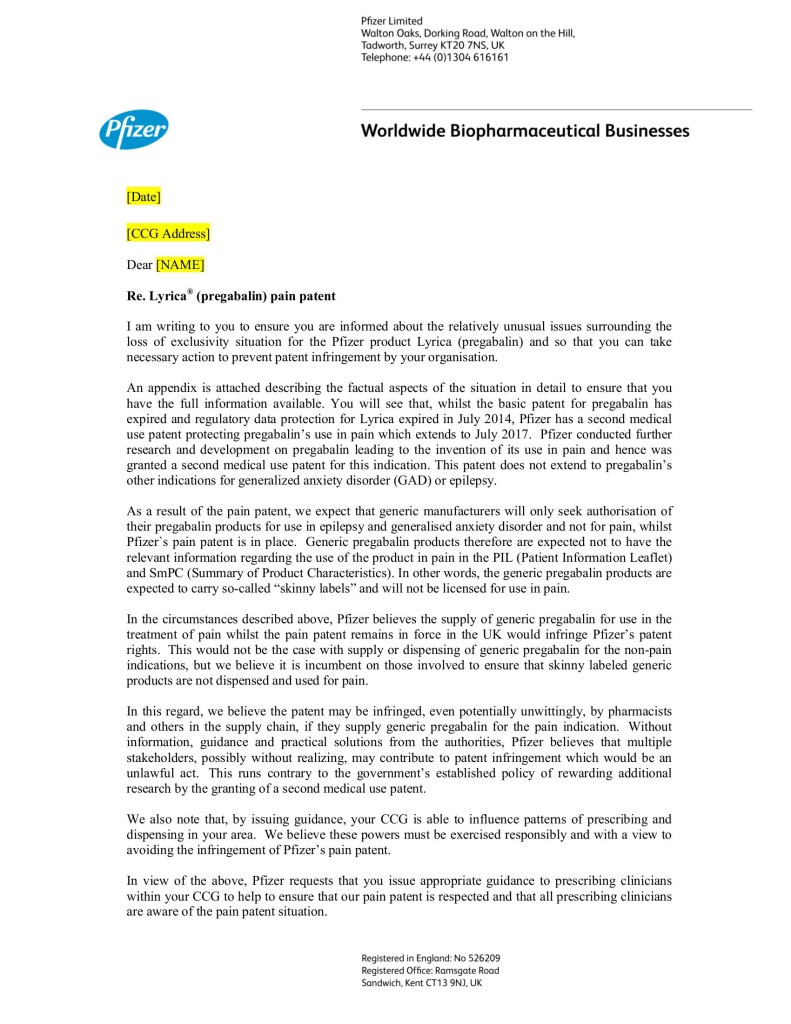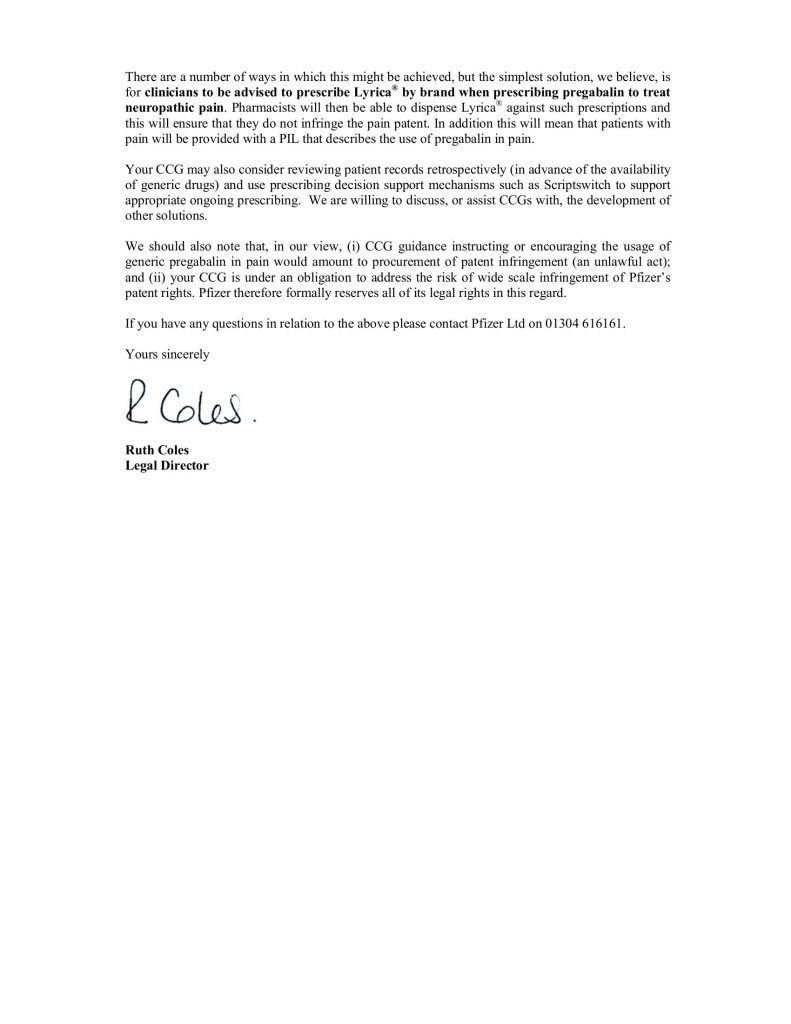NHS England advice
Click to access pregabalin-guidance.pdf
Click to access pregabalin-faqs.pdf
Court judgement Jan 15
http://www.bailii.org/ew/cases/EWHC/Patents/2015/72.html
approved judgement, March 15
“we therefore think it is important for you to understand that we believe the supply of generic pregabalin for use in treatment of pain, whist the pain patent remains in force in the UK, would be infringing Pfizer’s patent protection and would constitute an unlawful act” (letter from Pfizer to pharmacists)
PSNC.org statements
http://psnc.org.uk/our-news/dispensing-of-lyrica-pregabalin/
Pfizer statement (in full )
Background information from Pfizer on Lyrica pain patent and recent NHSE guidance
Background on second medical use patents
Broadly speaking, a ‘second medical use’ patent is one that relates to a new medical use for a known pharmaceutical or biological compound. They are recognised by law in Europe provided the specific use is novel.
It is vital that for each medical innovation, that the life science community is supported in our ongoing research throughout a medicines lifecycle to identify all those that could benefit, many of whom may suffer other illnesses and conditions beyond our initial understanding.
Patents, including second medical use patents, ensure that for a limited time only our innovation is protected. This in turn helps enable our investment in future R&D and supports us in the discovery of new and innovative treatments to improve patient outcomes. Protecting intellectual property is also integral to Government’s aspirations to be “the best place in the world for 21st century medical innovation”. This is made all the more pertinent in this case, with the use of Lyrica for treating pain being a British invention by our scientist in Cambridge.
With the changing R&D landscape, it is likely that second medical use patents will become more common and will be increasingly important in expanding the use and benefits of new medicines. We hope the work we have been doing with stakeholders across the NHS will help provide clarity around the Lyrica pain patent specifically but, more importantly, that it will also help ensure the right policy, infrastructure and guidance is in place to support and protect second medical use patents in the future.
It is important for every industry, not just the pharmaceutical industry, that innovation is sufficiently protected to encourage future investment in research and development.
Pfizer statement on legal proceedings
The basic patent for Lyrica®(pregabalin) and regulatory data protection have expired. However, Pfizer has a second medical use patent (new therapeutic use) protecting the use of pregabalin in pain until July 2017 (the “pain patent”).
Pfizer has filed a lawsuit against Actavis (Actavis Group PTC ehf, Actavis UK Limited, and Marketing Authorisation holder Caduceus Pharma Limited) for threatened infringement of the pain patent Patent EP(UK) 0 934 061 in the English High Court of Justice, Chancery Division, Patents Court, London. Pfizer has also filed infringement actions in the High Court against Dr Reddy’s (Dr. Reddy’s Laboratories (UK) Limited and Marketing Authorisation holder Caduceus Pharma Limited) and against Teva UK Limited.
Both Generics (UK) Limited (trading as Mylan) and Actavis Group PTC ehf have sought to challenge the validity of the pain patent in the English Patents Court.
A full hearing on infringement and validity of the pain patent is scheduled to begin on 29 June 2015. Pfizer believes the pain patent is valid and will be contesting the case vigorously. Pfizer is not seeking to prevent the use of generic pregabalin to treat generalised anxiety disorder or epilepsy.
Why was NHSE involved in legal proceedings?
This is an unprecedented situation for Pfizer and NHSE regarding the need for and issuing of central guidance for a second medical use patent that will likely have ramifications for the our wider healthcare system and industry in the near future.
The decision to call on NHSE as an intermediary in the ongoing patent infringement proceedings against Actavis is not one that Pfizer took lightly. It followed months of liaison between Pfizer and NHSE, and in the end it was determined that the Court was best placed to define the precise form and details of the guidance to be issued by NHSE.
Pfizer is confident that the outcome of this, with NHSE issuing central guidance that directs the prescription and dispensing of Lyrica®, by brand name only, when pregabalin is used for the treatment of neuropathic pain, will provide much-needed clarity. Following the guidance from NHSE, All Wales Chief Pharmacists Committee has also issued similar guidance in Wales. We are also in discussion with the authorities in Northern Ireland and Scotland in order to help ensure that clarity is provided to prescribers and pharmacists across all nations in the UK.
Pfizer recognises that the second medical use patent for Lyrica is a relatively unusual situation that has led to some confusion among prescribers and pharmacists. It is for this reason that we have been actively seeking to provide essential guidance for prescribers and pharmacists by engaging with a significant number of stakeholders over the past six months, including the Department of Health, commissioning bodies, pharmacy and GP associations as well as NHSE and other NHS devolved bodies.
Do pharmacists need to check with patients or GP each time they receive a script for pregabalin? Is Pfizer issuing any guidance to support pharmacists, as this is not covered in NHSE guidance?
The manner in which our national electronic prescribing system is set up means that pregabalin is typically prescribed by reference to its International Nonproprietary Name (i.e. “pregabalin”) rather than by brand name (i.e. Lyrica), regardless of the patient’s condition. As Pfizer has a second medical use patent protecting the use of pregabalin in pain until July 2017, this has led to some confusion among prescribers and pharmacists. This is why we have been working with stakeholders across the NHS for over 6 months to ensure essential guidance is in place.
Pfizer is confident that the guidance and FAQ issued by NHSE on 26 February for prescribers via Clinical Commissioning Groups (CCGs) and pharmacists via NHS Business Services Authority will provide much-needed clarity. This central guidance directs the prescription and dispensing of Lyrica®, by brand name only, when pregabalin is used for the treatment of neuropathic pain. We believe it will also, importantly, help to protect pharmacists from unwittingly infringing the pain patent.
Given the majority of prescriptions for Lyrica (pregabalin) are related to the treatment of neuropathic pain, and NHSE has now issued central guidance which prescribers can be expected to act on, we believe this will provide the necessary clarity and protection for pharmacists.
What percentage/volume of pregabalin scripts are for NeP?
The majority of prescriptions for Lyrica (pregabalin) are related to the treatment of neuropathic pain.
What will happen to pharmacists if they infringe the patent?
Pfizer does not wish to take legal action against any individuals or organisations in relation to this matter. We are therefore continuing our collaborative efforts with stakeholders across the NHS to ensure the essential guidance and infrastructure is in place to support prescribers and pharmacists across the UK.
We recognise this is a relatively unusual legal situation (rather than a clinical one) and it is for this reason we have been engaging with stakeholders across the NHS for over 6 months to ensure essential guidance is available. We are confident that the central guidance and FAQ recently issued by NHSE will provide much-needed clarity and will also, importantly, help protect pharmacists from unwittingly infringing the patent. As such, we are continuing to liaise with and support CCGs, GPs, pharmacists and prescribing software companies to help them access and implement the guidance. Pfizer has no issue with the supply of generic pregabalin to treat generalised anxiety disorder or epilepsy, which are not patent protected.
Given second medical use patents are likely to become more common and also increasingly important in expanding the use and benefits of new medicines as our industry’s R&D model evolves, we hope the work Pfizer has been doing with stakeholders across the NHS will help provide clarity around the Lyrica pain patent specifically but, more importantly, also help ensure the right policy, infrastructure and guidance is in place to support and protect all patents in the future.
The protection of patents, including second medical use patents, enables industry to continue investment in future R&D and supports us in the discovery of new and innovative treatments to improve patient outcomes, which is also fundamental to the future health of our nation.
Will Pfizer take action against individuals who infringe the patent?
Pfizer does not wish to take legal action against any individuals or organisations in relation to this matter. We are therefore continuing our collaborative efforts with stakeholders across the NHS to ensure the essential guidance and infrastructure is in place to support prescribers and pharmacists across the UK.
We recognise this is a relatively unusual legal situation (rather than a clinical one) and it is for this reason we have been engaging with stakeholders across the NHS for over 6 months to ensure essential guidance is available. We believe the central guidance and FAQ recently issued by NHSE will provide much-needed clarity and will also, importantly, help protect pharmacists from unwittingly infringing the patent. As such, we are continuing to liaise with and support CCGs, GPs, pharmacists and prescribing software companies to help them access and implement the guidance. Pfizer has no issue with the supply of generic pregabalin to treat generalised anxiety disorder or epilepsy, which are not patent protected.
Given second medical use patents are likely to become more common and also increasingly important in expanding the use and benefits of new medicines as our industry’s R&D model evolves, we hope the work Pfizer has been doing with stakeholders across the NHS will help provide clarity around the Lyrica pain patent specifically but, more importantly, that it will also help ensure the right policy, infrastructure and guidance is in place to support and protect all patents in the future.
The protection of patents, including second medical use patents, enables industry to continue investment in future R&D and supports us in the discovery of new and innovative treatments to improve patient outcomes, which is also fundamental to the future health of our nation.
uploaded from http://boingboing.net/2014/12/24/pfizer-threatens-pharmacists.html – 


2 Responses to “Lyrica vs pregabalin”